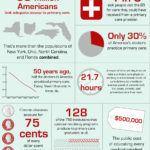Reflections on Primary Care
Over the past several months, I have been thinking a lot about the crisis of primary care in this country. That crisis has become very vivid as I have watched medical residents who have not chosen to become PCPs go through primary care rotations where they learn skills — like feedback, shared decision-making, and motivational interviewing — they have not been taught to value much throughout their medical training.
Nancy is one of those residents. A tall thin young woman with striking red hair, she is rotating through a primary care practice. As she tries to put into practice the patient centered care skills she is learning, she does so grudgingly. She is practicing patient centered care, role playing primary care, but you can tell from the tension on her face as she talks to patients that she does not find it either fulfilling or particularly convincing. What she wants are certainties, to order a test or procedure that will produce numbers that she can analyze, dissect, and then use to determine some kind of certainty (i.e treatment) that will deliver something concrete – something she can feel good about — no matter how fleeting.
 As I listen to some physicians -in -training lament the fact that their patients don’t comply with their regimens, take their meds, lose weight, stop smoking – for God’s sake just get with it. I want to take them in a big bear hug and say, honey, they are not the problem here you are. It’s you who need to get with it, and take responsibility for your attitude. Don’t you know that people are not always rational actors. We all do things we shouldn’t be doing. If our lives are tough, if we are poor, or mentally ill, or have been abused, or went to war, or have PTSD, or are unloved then change may even be a shimmering mirage or something that can only be approximated but never fully realized.
As I listen to some physicians -in -training lament the fact that their patients don’t comply with their regimens, take their meds, lose weight, stop smoking – for God’s sake just get with it. I want to take them in a big bear hug and say, honey, they are not the problem here you are. It’s you who need to get with it, and take responsibility for your attitude. Don’t you know that people are not always rational actors. We all do things we shouldn’t be doing. If our lives are tough, if we are poor, or mentally ill, or have been abused, or went to war, or have PTSD, or are unloved then change may even be a shimmering mirage or something that can only be approximated but never fully realized.
I want to ask them,” Isn’t there something you should do that you are not doing? Are you always unfailingly open with your loved ones? Do you always eat just the right stuff in just the right dose? Do you never get into fights with your friends and family? Do you always kiss and make up afterwards?
I know how difficult primary care must be. I have spent most of my life trying to get people to think about things differently. As a child of the 60’s, I grew up thinking I could change the world. I have never managed to read the news without getting upset, but I do manage to take comfort in the fact that I can maybe change a few minds, support a few good people, help a few people feel less frustrated and alone as they continue to push their rocks up some very, very high hills.
The hardest job of medicine, healthcare is not fixing and fighting. It’s supporting. It’s helping people find support as they try their best to cope. Maybe all these young residents are right. Maybe some of their patients will never get better, never really follow through. But maybe, just maybe, with their help, he will not get far worse.

I thought you might like to see this
http://boringem.org/2015/03/26/keep-emergency-for-emergencies/?utm_content=buffer371be&utm_medium=social&utm_source=facebook.com&utm_campaign=buffer
Cheers
Jacqui
Hi Suzanne,
Thanks for your honest and insightful post. I share some of your observations and frustrations as an RN/change agent. Is it about power? Status? Fear? Ego? What? Why is sharing power so hard for physicians? (I know there are exceptions so please forgive my generalization). Sometimes I find myself wondering if all good ideas must be channeled through physicians in order for them to have value! We definitely need news ways of thinking, but it is an uphill battle to get people in power to listen and try something new. Even though we absolutely need to have new ways of thinking. 15 years of focus on patient safety and we are still struggling!
I think if healthcare professionals aren’t motivated to some extent by compassion for others and to use their skills and expertise in service which I think would naturally include patient’s and families perspectives as a priority, then we have to ask WHO is healthcare FOR?
Beth
As a primary care doctor, that is a wonderful depiction of primary care!
Uncertainty is what our job is all about, and yet medical students (right from their pre-med years) are taught that they are scientists, and that there are yes/no discrete answers to all medical issues, and that touchy-feely is just wrong. Medical and pre-medical training is awful; it’s a huge part of the problem. Physical contact, eye contact, genuine empathy are all so important. We need human beings to be doctors, not scientists. If we want to change the system, we need to start at the root.